冀教版八年级下册Unit 7 Know Our World Unit Review课件(共31张PPT)
文档属性
| 名称 | 冀教版八年级下册Unit 7 Know Our World Unit Review课件(共31张PPT) | 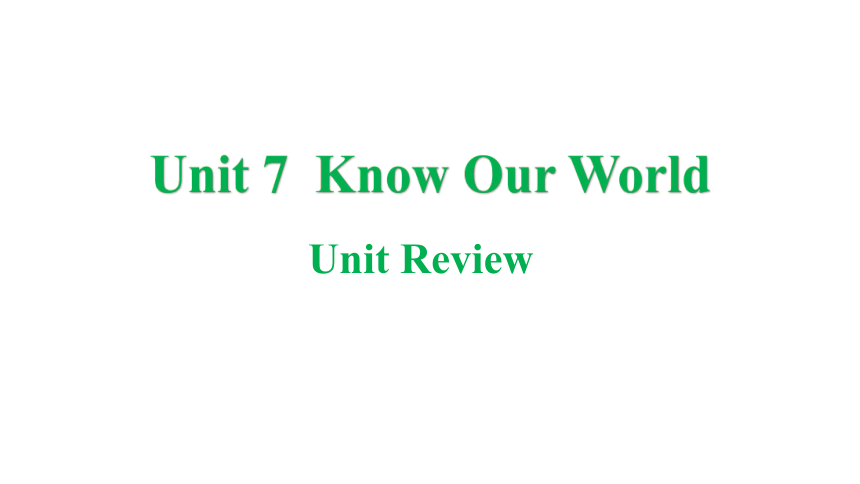 | |
| 格式 | pptx | ||
| 文件大小 | 349.7KB | ||
| 资源类型 | 教案 | ||
| 版本资源 | 冀教版 | ||
| 科目 | 英语 | ||
| 更新时间 | 2024-05-02 18:30:14 | ||
图片预览

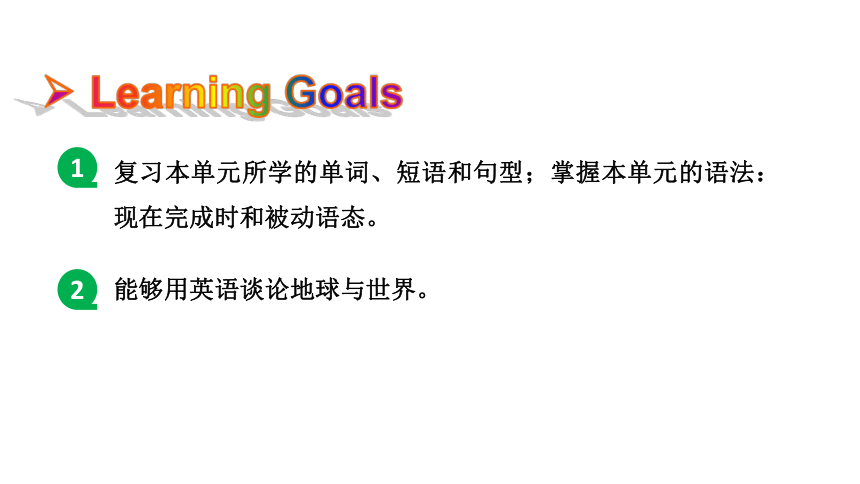
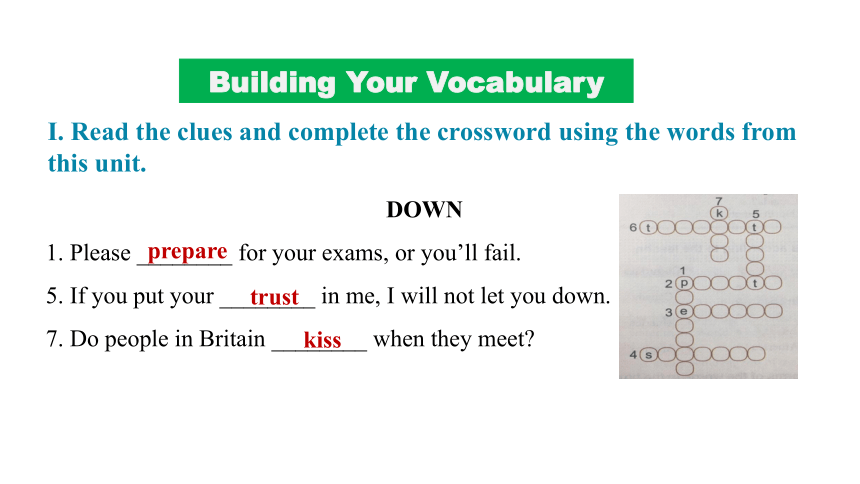
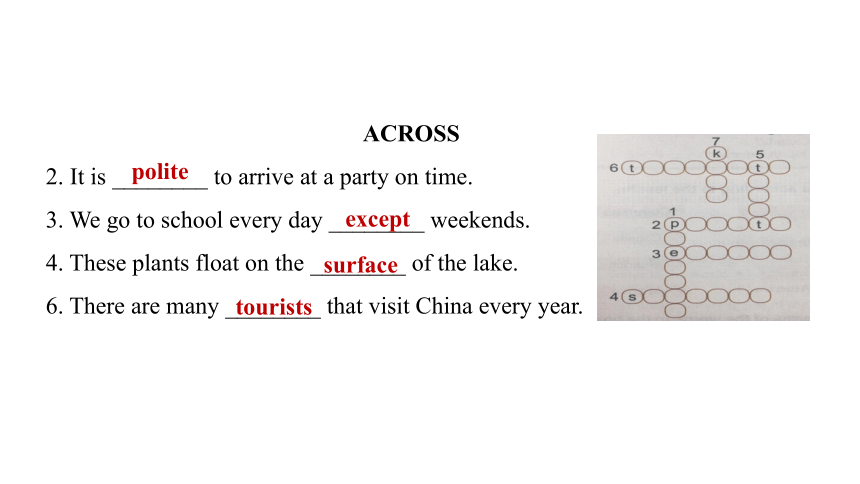
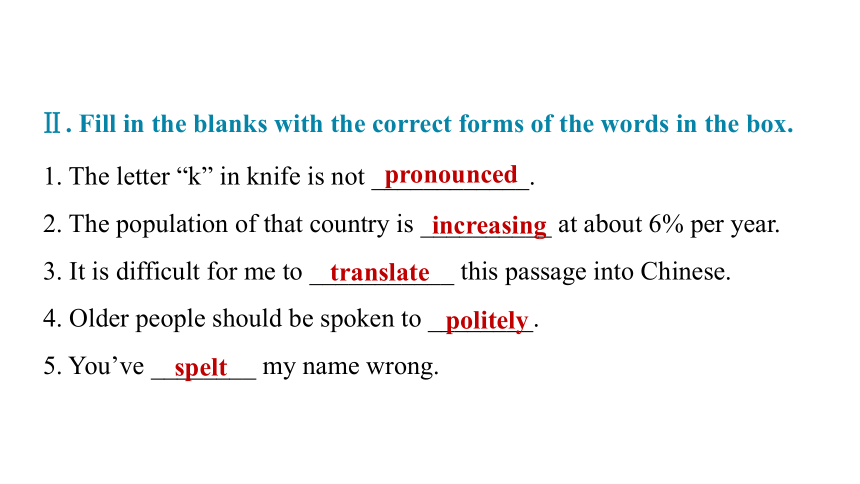
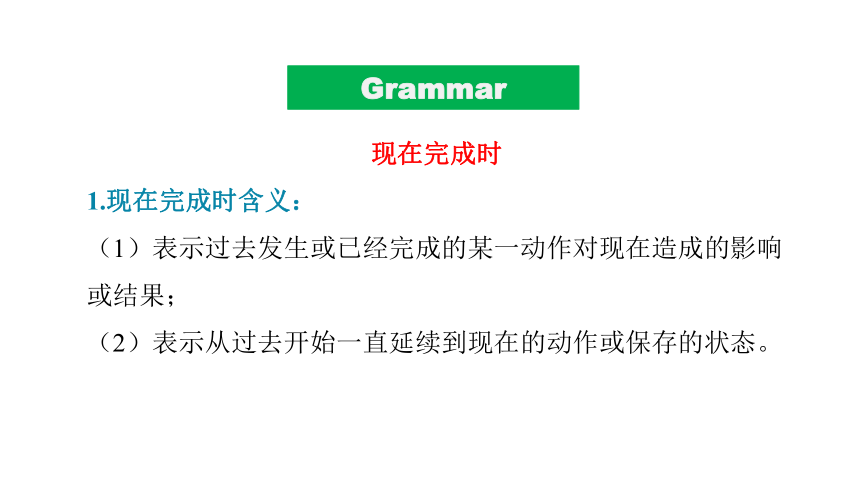
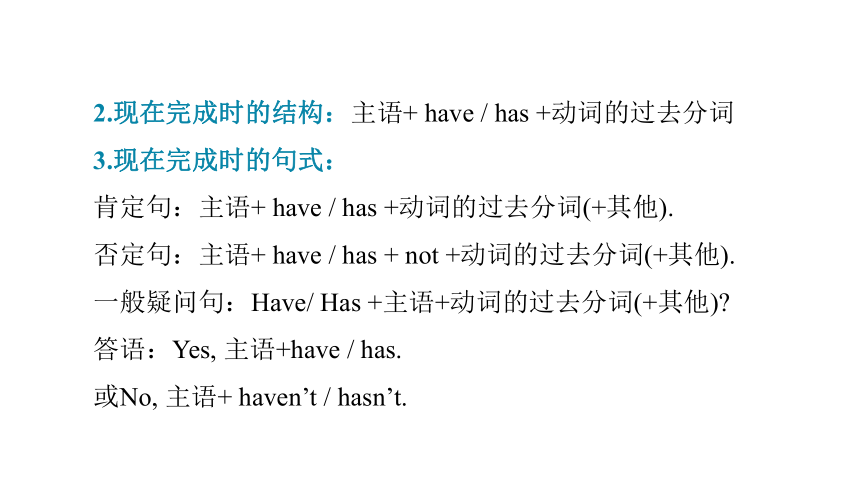
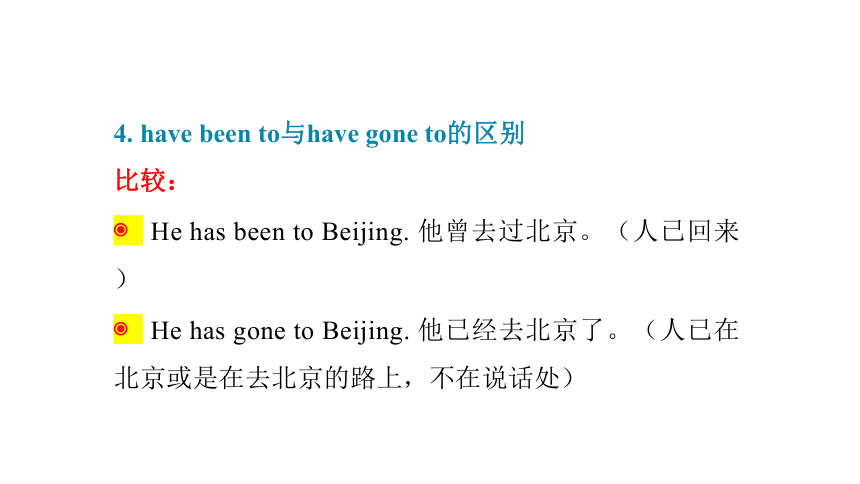
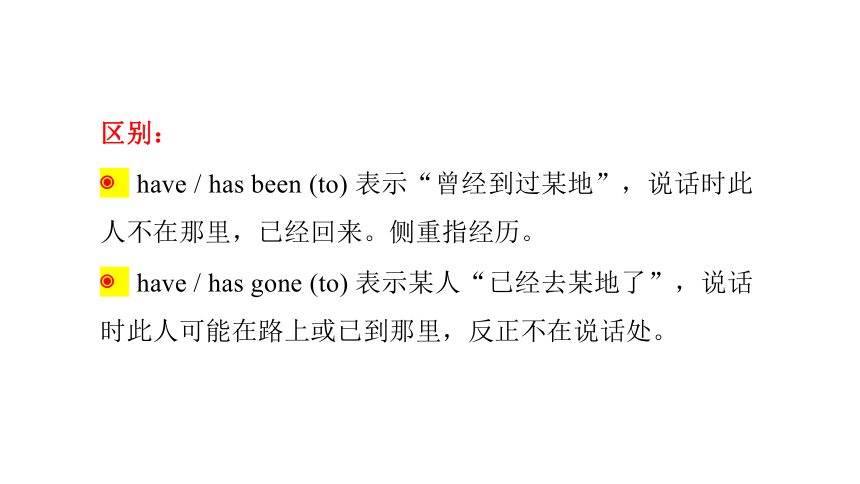
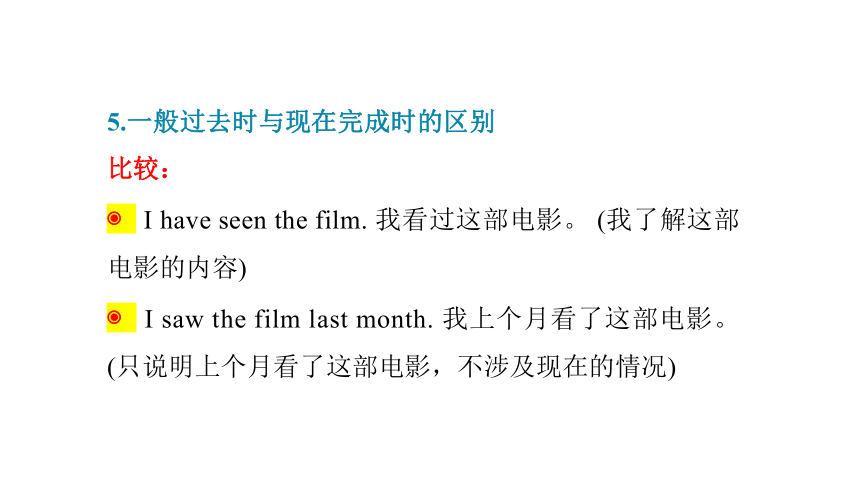
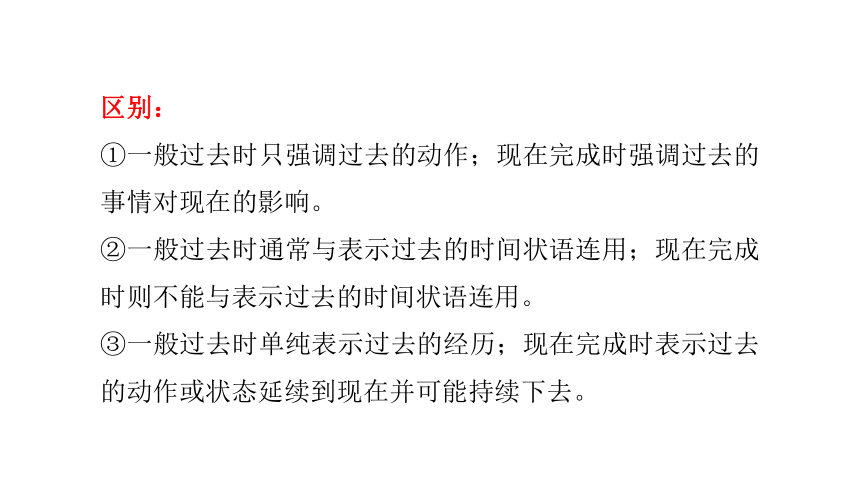
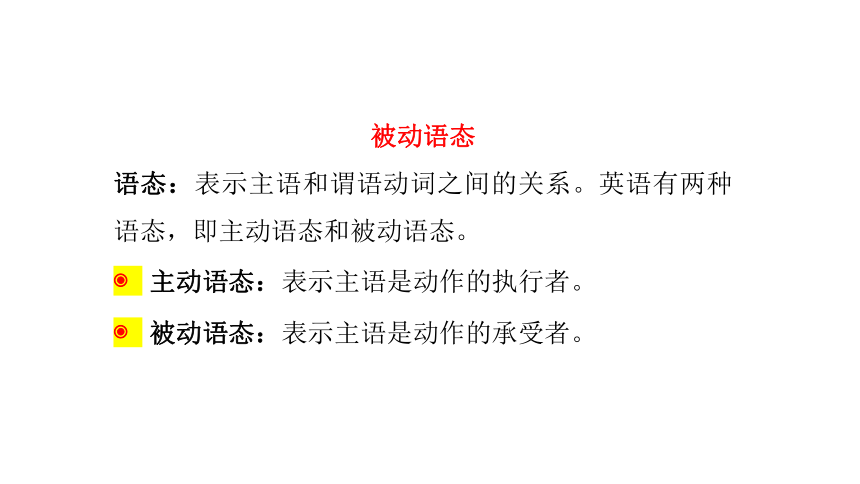
文档简介
(共31张PPT)
Unit Review
Unit 7 Know Our World
复习本单元所学的单词、短语和句型;掌握本单元的语法:现在完成时和被动语态。
能够用英语谈论地球与世界。
Learning Goals
1
2
Building Your Vocabulary
I. Read the clues and complete the crossword using the words from this unit.
DOWN
1. Please ________ for your exams, or you’ll fail.
5. If you put your ________ in me, I will not let you down.
7. Do people in Britain ________ when they meet
prepare
trust
kiss
ACROSS
2. It is ________ to arrive at a party on time.
3. We go to school every day ________ weekends.
4. These plants float on the ________ of the lake.
6. There are many ________ that visit China every year.
polite
except
surface
tourists
Ⅱ. Fill in the blanks with the correct forms of the words in the box.
1. The letter “k” in knife is not ____________.
2. The population of that country is __________ at about 6% per year.
3. It is difficult for me to ___________ this passage into Chinese.
4. Older people should be spoken to ________.
5. You’ve ________ my name wrong.
pronounced
increasing
translate
politely
spelt
Grammar
现在完成时
1.现在完成时含义:
(1)表示过去发生或已经完成的某一动作对现在造成的影响或结果;
(2)表示从过去开始一直延续到现在的动作或保存的状态。
2.现在完成时的结构:主语+ have / has +动词的过去分词
3.现在完成时的句式:
肯定句:主语+ have / has +动词的过去分词(+其他).
否定句:主语+ have / has + not +动词的过去分词(+其他).
一般疑问句:Have/ Has +主语+动词的过去分词(+其他)
答语:Yes, 主语+have / has.
或No, 主语+ haven’t / hasn’t.
4. have been to与have gone to的区别
比较:
He has been to Beijing. 他曾去过北京。(人已回来)
He has gone to Beijing. 他已经去北京了。(人已在北京或是在去北京的路上,不在说话处)
区别:
have / has been (to) 表示“曾经到过某地”,说话时此人不在那里,已经回来。侧重指经历。
have / has gone (to) 表示某人“已经去某地了”,说话时此人可能在路上或已到那里,反正不在说话处。
5.一般过去时与现在完成时的区别
比较:
I have seen the film. 我看过这部电影。 (我了解这部电影的内容)
I saw the film last month. 我上个月看了这部电影。(只说明上个月看了这部电影,不涉及现在的情况)
区别:
①一般过去时只强调过去的动作;现在完成时强调过去的事情对现在的影响。
②一般过去时通常与表示过去的时间状语连用;现在完成时则不能与表示过去的时间状语连用。
③一般过去时单纯表示过去的经历;现在完成时表示过去的动作或状态延续到现在并可能持续下去。
被动语态
语态:表示主语和谓语动词之间的关系。英语有两种语态,即主动语态和被动语态。
主动语态:表示主语是动作的执行者。
被动语态:表示主语是动作的承受者。
1.被动语态的用法
(1)用于不知道或没有必要说明动作的执行者时。例如:
※ My bike was stolen.
我的自行车被盗了。
(2)用于汉语中含有“被”“由”等意的句子时。例如:
※ Tina is asked to come by Paul.
Tina是被Paul叫来的。
2.被动语态的基本构成:
be + done + (by +动作的执行者)
3.不同时态被动语态的基本结构
一般现在时:am / is / are + done + by sb.
一般过去时:was / were + done + by sb.
现在进行时:am / is / are being + done + by sb.
过去进行时:was / were being + done + by sb.
一般将来时:will be / is going to be + done + by sb.
现在完成时:have / has been + done + by sb.
Example:
※ That computer is used by us everyday.
※ That computer was used by us yesterday.
※ That computer is being used by us now.
※ That computer was being used by us at this time of yesterday.
※ That computer will be / is going to be used by us in the future.
※ That computer has been used by us for three days.
Grammar in Use
Ⅰ. Fill in the blanks using “have / has been” or “have / has gone”.
1. I ________ ________ a middle school student for over two years.
2. He ________ ________ to school, so you can visit him there.
3. We ________ ________ in college for about three months.
4. She ________ ________ to see Xiao Hong. Please call her later.
5. A: Where’s Dad
B: He ________ ________ to Britain. He ________ ________ abroad several times.
have been
has gone
have been
has gone
has gone has been
Ⅱ. Fill in the blanks using the correct voice.
1. What language ___________(speak) in Canada
2. The stars can ______________(not see) in the daytime.
3. Planes, cars and trains __________(use) by business people for travelling.
4. Many tall buildings ____________(build) in our city next year.
5. This medicine should ___________(shake) before you take it.
is spoken
not be seen
are used
will be built
be shaken
6. These words could _______________(translate) by that girl.
7. Geography can ___________(learn) by travelling.
8. Our earth must ___________(treat) well.
9. It ________(say) that he has been to Antarctica.
10. Jim didn’t come to the party because he ______________ (not invite).
be translated
be learned
be treated
is said
wasn’t invited
Listening and Speaking
Ⅰ. Listen to the passage and match.
Germans
Americans
Englishmen
Italians
will probably be 15 minutes early.
will be 15 minutes late.
should be allowed up to an hour.
will arrive on time.
Ⅱ. Work in groups. Discuss what you know about different countries around the world and the places you are most interested in.
Putting It All Together
Ⅰ. Read the passage and answer the questions.
Asia
Asia is the largest continent in area and population. It covers more than 44 million square kilometres. There are more than forty countries in Asia. Some of them are China, India and Japan. China is the biggest country in area and population.
More than four billion people live in Asia. That’s more than half of the world’s population! Mount Qomolangma (or Mount Everest) is in the Himalayas. It is the highest mountain in the world. The Yangtze River (the Changjiang River) in China is the third longest river in the world.
1. Which is the biggest country in Asia
2. How many people live in Asia
3. What is the highest mountain
China is the biggest country in Asia.
More than four billion people live in Asia.
Mount Qomolangma is the highest mountain.
Ⅱ. Suppose you have a two -week holiday to travel. Make a plan and write a short passage.
Task tips:
Where are you going How are you going Who are you going with What are you going to do there
I have a two- week holiday. My parents and I want to go to Wuhu for my holiday. We will go there by train. We are going to go sightseeing and take some photos. Then we will visit Jiuzi Square and the Mirror Lake Park. Finally, we are going to enjoy some delicious food in the Food Street.
Self-Evaluation
Find more examples from this unit. Then mark your stars.
Ⅰ. Talking about Contrast and Comparison
But body language is not the same in all cultures.
______________________________________________
______________________________________________
I can express contrast and comparison in English.
☆ ☆ ☆ ☆ ☆
Sometimes we describe the same thing in different
ways or use different words.
Ⅱ. Present Perfect Tense
He has been to every continent except Antarctica.
She has gone to visit her.
_________________________________________
I know how to use the present perfect tense.
☆ ☆ ☆ ☆ ☆
Jenny and I have been to China twice.
Ⅲ. Passive Voice
These dry places are called deserts.
_____________________________________________
_____________________________________________
I know about the passive voice.
☆ ☆ ☆ ☆ ☆
It must be treated well for our children and for our
children’s children, too!
Practice
用括号内所给单词的适当形式填空。
1. Teenagers _________ (allow) to go out by their parents during every holiday.
2. The telephone _________ (invent) by Bell.
3. Look ! She ________ (eat) breakfast.
4. The car ____________ (make) next year .
5. We ____________ (clean) the room for two days .
6. Li Ming _______ (play) football at 9:00 yesterday .
are allowed
was invented
is eating
will be made
have cleaned
played
Homework
1. Remember the new words and expressions
learnt in Unit 7.
2. Review the grammar “Present perfect tense” and “Passive voice”.
Unit Review
Unit 7 Know Our World
复习本单元所学的单词、短语和句型;掌握本单元的语法:现在完成时和被动语态。
能够用英语谈论地球与世界。
Learning Goals
1
2
Building Your Vocabulary
I. Read the clues and complete the crossword using the words from this unit.
DOWN
1. Please ________ for your exams, or you’ll fail.
5. If you put your ________ in me, I will not let you down.
7. Do people in Britain ________ when they meet
prepare
trust
kiss
ACROSS
2. It is ________ to arrive at a party on time.
3. We go to school every day ________ weekends.
4. These plants float on the ________ of the lake.
6. There are many ________ that visit China every year.
polite
except
surface
tourists
Ⅱ. Fill in the blanks with the correct forms of the words in the box.
1. The letter “k” in knife is not ____________.
2. The population of that country is __________ at about 6% per year.
3. It is difficult for me to ___________ this passage into Chinese.
4. Older people should be spoken to ________.
5. You’ve ________ my name wrong.
pronounced
increasing
translate
politely
spelt
Grammar
现在完成时
1.现在完成时含义:
(1)表示过去发生或已经完成的某一动作对现在造成的影响或结果;
(2)表示从过去开始一直延续到现在的动作或保存的状态。
2.现在完成时的结构:主语+ have / has +动词的过去分词
3.现在完成时的句式:
肯定句:主语+ have / has +动词的过去分词(+其他).
否定句:主语+ have / has + not +动词的过去分词(+其他).
一般疑问句:Have/ Has +主语+动词的过去分词(+其他)
答语:Yes, 主语+have / has.
或No, 主语+ haven’t / hasn’t.
4. have been to与have gone to的区别
比较:
He has been to Beijing. 他曾去过北京。(人已回来)
He has gone to Beijing. 他已经去北京了。(人已在北京或是在去北京的路上,不在说话处)
区别:
have / has been (to) 表示“曾经到过某地”,说话时此人不在那里,已经回来。侧重指经历。
have / has gone (to) 表示某人“已经去某地了”,说话时此人可能在路上或已到那里,反正不在说话处。
5.一般过去时与现在完成时的区别
比较:
I have seen the film. 我看过这部电影。 (我了解这部电影的内容)
I saw the film last month. 我上个月看了这部电影。(只说明上个月看了这部电影,不涉及现在的情况)
区别:
①一般过去时只强调过去的动作;现在完成时强调过去的事情对现在的影响。
②一般过去时通常与表示过去的时间状语连用;现在完成时则不能与表示过去的时间状语连用。
③一般过去时单纯表示过去的经历;现在完成时表示过去的动作或状态延续到现在并可能持续下去。
被动语态
语态:表示主语和谓语动词之间的关系。英语有两种语态,即主动语态和被动语态。
主动语态:表示主语是动作的执行者。
被动语态:表示主语是动作的承受者。
1.被动语态的用法
(1)用于不知道或没有必要说明动作的执行者时。例如:
※ My bike was stolen.
我的自行车被盗了。
(2)用于汉语中含有“被”“由”等意的句子时。例如:
※ Tina is asked to come by Paul.
Tina是被Paul叫来的。
2.被动语态的基本构成:
be + done + (by +动作的执行者)
3.不同时态被动语态的基本结构
一般现在时:am / is / are + done + by sb.
一般过去时:was / were + done + by sb.
现在进行时:am / is / are being + done + by sb.
过去进行时:was / were being + done + by sb.
一般将来时:will be / is going to be + done + by sb.
现在完成时:have / has been + done + by sb.
Example:
※ That computer is used by us everyday.
※ That computer was used by us yesterday.
※ That computer is being used by us now.
※ That computer was being used by us at this time of yesterday.
※ That computer will be / is going to be used by us in the future.
※ That computer has been used by us for three days.
Grammar in Use
Ⅰ. Fill in the blanks using “have / has been” or “have / has gone”.
1. I ________ ________ a middle school student for over two years.
2. He ________ ________ to school, so you can visit him there.
3. We ________ ________ in college for about three months.
4. She ________ ________ to see Xiao Hong. Please call her later.
5. A: Where’s Dad
B: He ________ ________ to Britain. He ________ ________ abroad several times.
have been
has gone
have been
has gone
has gone has been
Ⅱ. Fill in the blanks using the correct voice.
1. What language ___________(speak) in Canada
2. The stars can ______________(not see) in the daytime.
3. Planes, cars and trains __________(use) by business people for travelling.
4. Many tall buildings ____________(build) in our city next year.
5. This medicine should ___________(shake) before you take it.
is spoken
not be seen
are used
will be built
be shaken
6. These words could _______________(translate) by that girl.
7. Geography can ___________(learn) by travelling.
8. Our earth must ___________(treat) well.
9. It ________(say) that he has been to Antarctica.
10. Jim didn’t come to the party because he ______________ (not invite).
be translated
be learned
be treated
is said
wasn’t invited
Listening and Speaking
Ⅰ. Listen to the passage and match.
Germans
Americans
Englishmen
Italians
will probably be 15 minutes early.
will be 15 minutes late.
should be allowed up to an hour.
will arrive on time.
Ⅱ. Work in groups. Discuss what you know about different countries around the world and the places you are most interested in.
Putting It All Together
Ⅰ. Read the passage and answer the questions.
Asia
Asia is the largest continent in area and population. It covers more than 44 million square kilometres. There are more than forty countries in Asia. Some of them are China, India and Japan. China is the biggest country in area and population.
More than four billion people live in Asia. That’s more than half of the world’s population! Mount Qomolangma (or Mount Everest) is in the Himalayas. It is the highest mountain in the world. The Yangtze River (the Changjiang River) in China is the third longest river in the world.
1. Which is the biggest country in Asia
2. How many people live in Asia
3. What is the highest mountain
China is the biggest country in Asia.
More than four billion people live in Asia.
Mount Qomolangma is the highest mountain.
Ⅱ. Suppose you have a two -week holiday to travel. Make a plan and write a short passage.
Task tips:
Where are you going How are you going Who are you going with What are you going to do there
I have a two- week holiday. My parents and I want to go to Wuhu for my holiday. We will go there by train. We are going to go sightseeing and take some photos. Then we will visit Jiuzi Square and the Mirror Lake Park. Finally, we are going to enjoy some delicious food in the Food Street.
Self-Evaluation
Find more examples from this unit. Then mark your stars.
Ⅰ. Talking about Contrast and Comparison
But body language is not the same in all cultures.
______________________________________________
______________________________________________
I can express contrast and comparison in English.
☆ ☆ ☆ ☆ ☆
Sometimes we describe the same thing in different
ways or use different words.
Ⅱ. Present Perfect Tense
He has been to every continent except Antarctica.
She has gone to visit her.
_________________________________________
I know how to use the present perfect tense.
☆ ☆ ☆ ☆ ☆
Jenny and I have been to China twice.
Ⅲ. Passive Voice
These dry places are called deserts.
_____________________________________________
_____________________________________________
I know about the passive voice.
☆ ☆ ☆ ☆ ☆
It must be treated well for our children and for our
children’s children, too!
Practice
用括号内所给单词的适当形式填空。
1. Teenagers _________ (allow) to go out by their parents during every holiday.
2. The telephone _________ (invent) by Bell.
3. Look ! She ________ (eat) breakfast.
4. The car ____________ (make) next year .
5. We ____________ (clean) the room for two days .
6. Li Ming _______ (play) football at 9:00 yesterday .
are allowed
was invented
is eating
will be made
have cleaned
played
Homework
1. Remember the new words and expressions
learnt in Unit 7.
2. Review the grammar “Present perfect tense” and “Passive voice”.
同课章节目录
- Unit 1 Spring Is Coming
- Lesson 1 How's the weather?
- Lesson 2 It's Getting Warmer!
- Lesson 3 Sun Is Rising
- Lesson 4 The Spring City
- Lesson 5 Babysitting on a Spring Day
- Lesson 6 Stories about Spring
- Unit 2 Plant a Plant
- Lesson 7 Planting Trees
- Lesson 8 Why Are Plants Important?
- Lesson 9 Gardening with Mary
- Lesson 10 Make Your Garden Grow!
- Lesson 11 Amazing Plants
- Lesson 12 Danny's Plant
- Unit 3 Animals Are Our Friends
- Lesson 13 Danny's Big Scare
- Lesson 14 Amazing Animals
- Lesson 15 The Zoo Is Open
- Lesson 16 The Pear Escaped
- Lesson 17 Save the Tigers
- Lesson 18 Friendship Between Animals
- Unit 4 The Internet Connects Us
- Lesson 19 How Do You Use the Internet?
- Lesson 20 A Computer Helps!
- Lesson 21 Books or Computers?
- Lesson 22 Travel on the Internet
- Lesson 23 The Internet--Good or Bad?
- Lesson 24 An E-mail to Grandpa
- Unit 5 Buying and Selling
- Lesson 25 Raising Money
- Lesson 26 Cookies, Please!
- Lesson 27 Business English
- Lesson 28 Ms. Liu's Great Idea
- Lesson 29 How to Push a Product
- Lesson 30 A Cookie Sale
- Unit 6 Be a Champion!
- Lesson 31 Don't Fall, Danny
- Lesson 32 My Favourite Record
- Lesson 33 2800 Years of Sports
- Lesson 34 Modern Olympics
- Lesson 35 The Dream Team
- Lesson 36 Classroom Olympics
- Unit 7 Know Our World
- Lesson 37 Let's Learn Geography!
- Lesson 38 The World Is a Big Place
- Lesson 39 Ring Up or Call?
- Lesson 40 Body Language
- Lesson 41 A Class of the World
- Lesson 42 North America
- Unit 8 Save Our World
- Lesson 43 Let's Clean Up!
- Lesson 44 Environment Clubs
- Lesson 45 Let's Sort Garbage!
- Lesson 46 Protect Our Environment
- Lesson 47 Connected to Nature
- Lesson 48 Garbage Is Interesting!
